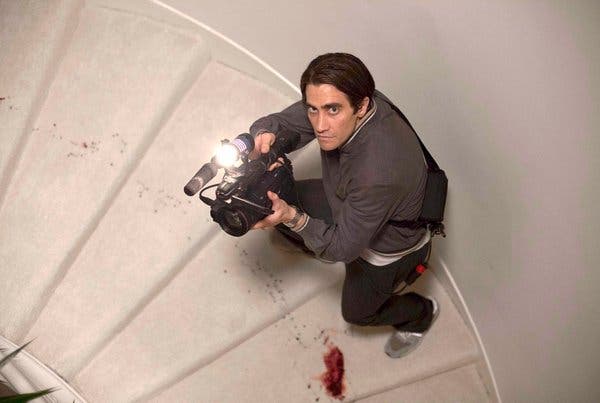If it Bleeds, it Leads

(screenshot courtesy of New York Times)
Lou Bloom explores an active crime scene before the police arrive
One of the most jarring moments in Nightcrawler comes when Jake Gyllenhaal’s character, Louis Bloom, explores an in-progress crime scene. Hearing about a home invasion on a police scanner, he arrives just as several gunmen leave. He then explores the home and records numerous dead bodies. The news company he sells his footage to questions the ethics of the recordings, but ultimately decides to air it as a competitive maneuver.
A 2014 neo-noir crime thriller directed by Dan Gilroy, the film follows the exploits of Louis Bloom (Jake Gyllenhaal), a Los Angeles drifter who finds his way into filming crime scenes. He partners up with the reluctant, yet desperate Rick (Riz Ahmed), and extorts a local news director, Nina Romina (Rene Russo). Over the course of almost two hours, the film explores Bloom’s moral code, or lack thereof, as his newfound career devolves into a dangerous obsession.
Gilroy first concieved the idea in 1988 after reading Naked City, a photobook by Arthur “Weegee” Fellig. However, he shelved the idea for several years after the release of The Public Eye (1992). When he regained some inspiration, he took several years to design the plot and characters. After completing the script, he reached out to Gyllenhaal, who accepted the role of Bloom and became involved in other aspects of the film. Ahmed, Russo (Gilroy’s wife), and the rest of the cast were added before filming began in October 2013, and then being theatrically released one year later. The film received favorable reviews, and the aspect that was praised the most was the portrayal of Bloom by Gyllenhaal.
Gyllenhaal’s performance as Bloom is one of the more underrated roles in recent memory. It won several “Best Actor” awards in numerous metropolitan film societies, as well as a Saturn Award nomination. However, the lack of a nomination from the Academy Awards is questionable, and straddles the line of being disrespectful. Unfortunately, being snubbed from the Oscars is something Gyllenhaal has faced several times, only receiving one nomination for Brokeback Mountain (2005).
It could be argued that Nightcrawler was, and still is, his best performance, however, it certainly has some competition. One of his earliest roles was in Richard Kelly’s Donnie Darko (2001), and it still stands up today as one of his premier gigs. Other performances that could rival Nightcrawler include Brokeback Mountain (2005), Zodiac (2007), and Prisoners (2013). Even after his role as Bloom, Gyllenhaal continued to add to his repertoire in Demolition (2015) and Spider-Man:Far From Home (2019). So what makes Nightcrawler his magnus opus? Simply put, it’s the nuance that he gives Bloom.
The most blatant aspect of Bloom’s character is his psychopathic tendencies, and Gyllenhaal certainly hits the “goldilocks zone”. He doesn’t go over the top (think Christian Bale in American Pyscho), but he doesn’t take it too easy either. The end product is a realistically terrifying character; a person who could feasibly exist, but also exudes some creepy behavior. Bloom is not the standard horror movie serial killer, he has (very questionable) motivations that drive him to do the things he does. He starves for money and power in a very believable way, and what makes it so believable is Gyllenhaal’s portrayal.
The physical mannerisms that Gyllenhaal gives Bloom takes what is on the script and turns him into an incredibly realistic and deep character. Gyllenhaal himself describes him as a “hungry coyote”. Bloom is gaunt, and he looms over people like a scavenger scouting a meal. His wide-eyed, analytical stare and slight hunch allows the viewer to understand his focus and intent on improving his alien-like understanding of human interaction. Gyllenhaal’s speech as Bloom is uncomfortable to listen to, but it fits the character well. The near-statistical way he approaches a bloody car crash exhibits his psychopathy–all without saying a word. Gyllenhaal’s physical performance is great because he uses mannerisms that make Bloom believable, which is the most important part of a movie; it needs to sell the plot and characters to the viewer.
Gyllenhaal’s dialogue is another reason the performance is his best. Bloom has no idea how to talk to people. The way he holds a conversation makes it seem like he isn’t even human, and is attempting to learn how a human talks. Throughout the movie, it seems like a conversation is an opportunity for Bloom to improve his poor understanding of social interaction, as if he is taking notes. All in all, Gyllenhaal takes an absolutely terrifying character and gives him depth and nuance, and the result is a legendary feat in recent cinematic history. Nightcrawler posits an argument for being the best movie in the last ten years.
The 2010’s were a decade packed with spectacular films, ranging from science-fiction epics like Interstellar (2014) and westerns like The Revenant (2016), dramas like The Social Network (2010) to period pieces like Once Upon a Time in Hollywood (2019). So in a field full of Oscar winners and fan favorites, what separates Nightcrawler from the rest is it’s meticulous dedication to its theme.
Nightcrawler does not dawdle on the mundane or irrelevant. It gets right to the point and pounds it in. Within the first quarter of the movie, Bloom has established himself onscreen and has already involved Rick and Nina in his business. We barely see what Bloom’s homelife is like, or what happens at the crime scenes he descends upon, because it simply doesn’t matter. Nightcrawler is not a biography; it is an exploration of greed and ambition. The speed that it moves at ensures that the viewer is never bored.
One of the most interesting methods that Nightcrawler uses was it’s perspective. While it may seem like the film only follows Bloom, in reality, it is told from his point of view, even if it isn’t very clear. Perhaps the best example of this is the film’s soundtrack, composed by James Newton Howard. When Bloom is analyzing a horrific crime scene, the music is proud and upbeat, which does not necessarily fit such an environment. This fits the film perfectly, because a murder scene or car crash is a good thing for Bloom, as he sees it as an oppourtunity to profit, so the music should compliment this.
Another case for Nightcrawler being one of the best films of the decade is the combination of it’s previously explained greatness and it’s uniqueness. Crime thrillers were no rare commodity in the 2010’s, but the niche that Gilroy found was novel idea. A film that follows an independent journalist as he speeds across Los Angeles filming crime scenes is incredibly creative, and helps Nightcrawler separate itself from the pool of overdone superhero and horror movies.
On a deeper level, Nightcrawler provides an interesting critique of the modern world that can leave the viewer thinking about the movie well after the credits roll. On a small scale, the film shows the danger of what psychopaths can do. However, the larger message that Bloom’s adventure attempts to provide the viewer is the danger of mass media and consumer culture.
This message is portrayed both in the metaphorical and literal. Metaphorically, Bloom represents corporate greed and Rick represents the victim of said greed. Bloom exploits and abuses Rick, and bases his performance on numbers, in a similar way to the approach that corporations take to their own employees. Bloom’s willingness to alter a crime scene or invade a police-only zone for the sake of profit is also an unfortunately real world parallel to corporate disregard for laws or common morals. His reckless driving and violation of numerous traffic laws is representative of the way that people will put themselves in extremely dangerous situations to make a few dollars.
On a more literal note, the movie is about psychopaths. When looking purely at what happens from start to finish, it is obvious that Bloom’s mental instability damages him, Rick, Nina, and countless other people in the night crawling world.
It also provides a warning to the viewer, about the dangers of psychopaths in positions of power. Bloom begins the movie as a vagrant, and by the end, he has established a business based on intrusive journalism.
Nightcrawler is undoubtedly one of the best films of the 2010’s, thanks in part to Gyllenhaal’s career-defining performance, and also delivers an interesting critique of mass media culture and consumerism.
10/10
Hello, my name is Sam Mollineaux and I am a junior at Triton High School. I like to run, fish, and watch movies. I am a lifeguard. I live in Newbury with...






